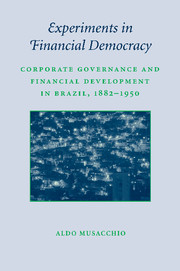 Experiments in Financial Democracy
Experiments in Financial Democracy Published online by Cambridge University Press: 30 January 2010
The estimates of stock and bond market capitalization presented in the previous chapter reveal that the development of these markets enjoyed a significant period of activity during the three decades from 1882 to 1913, but not whether that development mattered for Brazil. This chapter argues that this first peak of stock market activity had a considerable impact on Brazil's transformation into a more urbanized, industrialized economy.
At the end of the nineteenth century Brazil was still predominantly an agricultural economy. Most of the population lived in rural areas and worked in agriculture or in activities related to agriculture. Therefore this chapter describes not only the rise of equity and bond markets, but also the beginning of the transformation of Brazil from an agricultural economy to a more urbanized society with a larger proportion of the population working in manufacturing and services. It shows that the stock exchange helped to mobilize resources for emerging sectors (e.g., manufacturing, utilities, and urban improvements), which accelerated the rate of urbanization, industrialization, and, ultimately, economic growth.
The last decade of the nineteenth century was particularly important for the transformation of the country into a more industrialized society. Slavery was abolished in 1888 and European immigrants were imported en masse after the 1880s. With state-sponsored programs to bring immigrants from southern Europe to work at coffee plantations and in urban manufacturing centers, wage labor markets changed significantly, especially in the intererior of the country.
To save this book to your Kindle, first ensure [email protected] is added to your Approved Personal Document E-mail List under your Personal Document Settings on the Manage Your Content and Devices page of your Amazon account. Then enter the ‘name’ part of your Kindle email address below. Find out more about saving to your Kindle.
Note you can select to save to either the @free.kindle.com or @kindle.com variations. ‘@free.kindle.com’ emails are free but can only be saved to your device when it is connected to wi-fi. ‘@kindle.com’ emails can be delivered even when you are not connected to wi-fi, but note that service fees apply.
Find out more about the Kindle Personal Document Service.
To save content items to your account, please confirm that you agree to abide by our usage policies. If this is the first time you use this feature, you will be asked to authorise Cambridge Core to connect with your account. Find out more about saving content to Dropbox.
To save content items to your account, please confirm that you agree to abide by our usage policies. If this is the first time you use this feature, you will be asked to authorise Cambridge Core to connect with your account. Find out more about saving content to Google Drive.